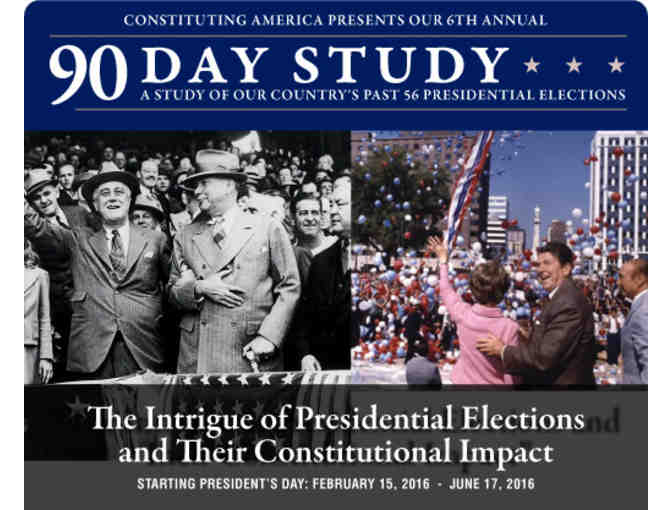Books
90 Day Study from 2016! "A Study of our Country's Past 56 Presidential Elections"!
- Item Number
- 207
- Estimated Value
- 100 USD
- Sold
- 70 USD to ke0feb56c
- Number of Bids
- 2 - Bid History
Item Description
This is Constituting America's 2016 90 Day Study (Our Sixth!), written by Constitutional scholars. This is not a book but a sizeable "bound" Report.
"A Study of Our Country's Past 56 Presidential Elections: The Intrigue of Presidential Elections and Their Constitutional Impact."
“90 in 90 Study Program” (90 Essays Written over 90 Days) These are valuable, important studies and being used in many academic areas and by scholars....a treasure for today and the future.
The Story of Constituting America's 90 Day Studies:
In 2010, Constituting America launched the “90 in 90 Initiative,” an online forum that engages Americans to join with others around the nation in reading and discussing America’s founding documents over a 90 day period. Students may explore original documents as well as 530 essays by 85 constitutional Scholars. “Our ‘90 in 90 Study Program’ is a scholastic examination with essays on the founding documents of our country written by brilliant professors and constitutional scholars from some of the best colleges, universities and law schools in the country.”
“After reading the eighty-five opinion editorials in The Federalist, written by “Publius,” (the pseudonym used by Alexander Hamilton, James Madison and John Jay,) Janine Turner and Cathy Gillespie, in 90 days, wrote eighty-five corresponding essays to promote Constituting America. Janine wrote, “I was on fire to share the astounding relevance of their words and wisdom. I was, and am, simply amazed by their genius.”
In minute detail these essays explain each opinion editorial in The Federalist, every clause and section of the Constitution and the classic works by Aristotle, Cicero and others that shaped our U.S. Constitution.
We have been told by teachers, professors and students that these studies are invaluable, especially for the thoroughness with which the 85 Federalist Papers are examined and explained. These studies are appropriate for high school, undergraduate and graduate level research and studies.
Amanda Hughes serves as Outreach Director, and 90 Day Study Director, for Constituting America. She is the author of Who Wants to Be Free? Make Sure You Do!, and a story contributor for the anthologies Loving Moments(2017), and Moments with Billy Graham (forthcoming).
Amanda Hughes, Outreach Director Constituting America
Phone: 888-937-0917
Cell: 202-904-5988
ConstitutingAmerica.org
Newsletter Signup
Facebook.com/ConstitutingAmerica
Twitter: @ConstituteUS
Free Shipping!
Item Special Note
Communism and Civil Liberties: The Election of 1952
By Horace Cooper
"The election of 1952 brought about the first GOP presidential victory in more than 20 years. It came about at a time while many in America were weary from World War II, and they were very apprehensive about the potential for subversion by the Soviet Union and its radical Marxist ideology.
Eisenhower, a war hero, had been Supreme Commander of Allied Forces during World War II, president of Columbia University, and the head of NATO before becoming the Republican nominee. His general election opponent was Illinois Governor Adlai Stevenson.
While both political parties nominally opposed the threat presented by international communism, many in the public were concerned that the Truman administration wasn’t fully committed to this conflict. This concern was exacerbated by the revelation that Alger Hiss, a Roosevelt senior appointee was in fact a Soviet Spy. Creating even graver public apprehension was the indictment and conviction of Ethel and Julius Rosenberg for treason related to their efforts to transfer operational knowledge of America’s nuclear weapons program. Their actions obviated many of the benefits of using America’s nuclear shield as a tool to protect the US and her allies risking instead a potential worldwide holocaust if tensions escalated between America and the Soviet Union.
The House of Representatives had convened a special committee after the mid-term elections of 1946 called the House Committee on Un-American Activities. It held hearings that revealed multiple instances of Soviet breeches of the US government and American society.
Indeed even the Truman Administration had put in place a loyalty pledge for all federal employees, Executive Order 9835. Under the terms of the order, the FBI working in tandem with agency created loyalty boards was empowered to investigate whether any of the nearly 2 million federal employees had questionable associations and beliefs or had supported sabotage, treason or the unauthorized disclosure of sensitive/confidential information. In practice, loyalty boards focused more on creating high profile news stories and ruining reputations than they did any serious effort to ferret out subversives.
The Supreme Court weighed in on civil liberties and the Cold War in Dennis v. United States, a case that involved the arrest of several members of the Communist Party USA (CPUSA) charged with advocating the violent overthrow of the US government and for the violating the Smith Act, an anti-sedition federal statute which made it a crime to “teach, advocate, or encourage the overthrow or destruction of … government by force or violence.”
The party members charged argued that they had been petitioning for socialist reforms and claimed that the act violated their First Amendment rights. The Supreme Court did not agree.
Handed down as a 6-2 decision by the Court on June 4, 1951, the Supreme Court upheld the charges. “Certainly an attempt to overthrow the Government by force, even though doomed from the outset because of inadequate numbers or power of the revolutionists, is a sufficient evil for Congress to prevent,” wrote Chief Justice Frederick Vinson.
It was clear to most Americans heading into the election of 1952 that there was indeed a real and grave threat posed by the Soviet Union and her Marxist supporters here and abroad.
It was this backdrop that influenced the 1952 presidential campaign. Eisenhower successfully used a three-pronged campaign, attacking “Korea, Communism, and Corruption”— as failures of the outgoing Truman administration. Eisenhower’s victory was fairly impressive. Losing only 9 states, he racked up an impressive Electoral College victory and in the process won the popular vote by more than 11 points nationwide.
The Supreme Court, the newly elected president and (importantly by selecting Eisenhower), the American people all converged on a view that an aggressive effort to thwart Marxist-Leninism at home and abroad was a fundamental responsibility of the American federal government.
One of President Eisenhower’s first acts was to repeal Truman’s loyalty program and to replace it with EO 10450. This presidential order eliminated regional and statewide loyalty boards and instead put the heads of federal agencies and the OPM in charge of investigating federal employees to determine whether they posed security risks. Instead of high profile hearings in Congress or by federal agency created loyalty boards, the order served to depoliticize and professionalize the federal employment background investigation process.
In Eisenhower’s inaugural address he described a fight that involved “freedom being pitted against slavery” and “lightness against dark.” In keeping with that mission, Eisenhower signed into law the Communist Control Act. The act passed the House and the Senate nearly unanimously with only two nay votes in the House of Representatives. Drafted to circumscribe Marxism and ban the ability of the CPUSA to operate openly to take over federal, state or local governments, it was described as distinct from a mere political party and instead an operative of a network of hostile governments including the USSR.
In addition, as president, Eisenhower named John Foster Dulles as his Secretary of State. Dulles laid out an aggressive plan to “roll-back” international communism as opposed to the existing plan of containing it where it existed. Years later Ronald Reagan’s election would see the fulfillment of this effort with the collapse of the Soviet Union.
This action of Congress and Eisenhower to target and isolate subversive communism — at home and abroad — was seen by the public, the elected political spectrum (left, right and middle) and the Courts as key to the ability of America’s ongoing ability to exist and thrive. As broad and comprehensive as the Communist Containment law is on its own terms, the US Supreme Court of the United States has never ruled on its constitutionality and it remains law today along with America’s commitment to a strong military internationally as examples that stymying existential threats to our nation supersede almost all other interests."
Horace Cooper is a legal commentator and a fellow at the National Center for Public Policy Research.
This entry was posted on Friday, May 27th, 2016 at 1:00 am and is filed under 6. Guest Constitutional Scholar Essayists, 90 in 90 2016, Horace Cooper. You can follow any responses to this entry through the RSS 2.0 feed. You can leave a response, or trackback from your own site.
- See more at: http://www.constitutingamerica.org/blog/1952-dwight-d-eisenhower-defeats-adlai-stevenson-communism-and-civil-liberties-guest-essayist-horace-cooper/#more-9294
Constituting America stores data...
Your support matters, so Constituting America would like to use your information to keep in touch about things that may matter to you. If you choose to hear from Constituting America, we may contact you in the future about our ongoing efforts.
Your privacy is important to us, so Constituting America will keep your personal data secure and Constituting America will not use it for marketing communications which you have not agreed to receive. At any time, you may withdraw consent by emailing Privacy@frontstream.com or by contacting our Privacy Officer. Please see our Privacy Policy found here PrivacyPolicy.


